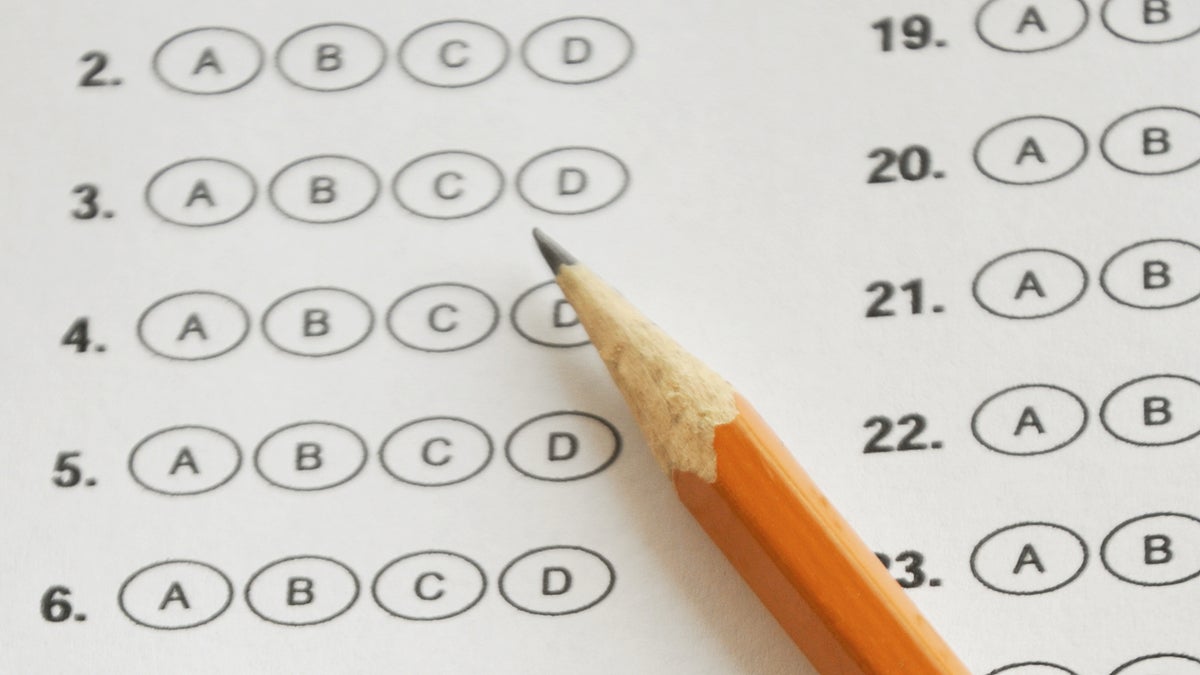New Jersey should embrace the new tougher national standardized tests

(Photo from Shutterstock)
This is part of a series from education blogger Laura Waters of NJ Left Behind.
Stan Karp, Director of Secondary Education Reform for New Jersey’s Education Law Center (ELC), is worried about the new national standardized tests in language arts and math that New Jersey students will take in 2015.
These tests, produced for N.J. and 19 other states by a consortium called Partnership for the Assessment of Readiness for College and Careers (PARCC), are tied to the new K-12 curriculum called the Common Core State Standards. Both the curriculum and the tests will be more rigorous those currently in place in every state in the country (except Massachusetts, where the state curriculum already sets ambitious benchmarks for students).
In particular, Mr. Karp is concerned about New Jersey’s practice of requiring a passing score on a high school proficiency test (the HSPA) in order to get a high school diploma. In Spring 2015, the HSPA – considered by many to be an 8th grade level test – will be supplanted by the PARCC assessment. In an editorial in this week’s NJ Spotlight he writes,
“If New Jersey adopts PARCC’s “college and career ready” score as the threshold for high school graduation, thousands, or perhaps tens of thousands, of students will not get a diploma, even if they pass all their courses and meet all other requirements.”
Instead, he suggests, we should either hold off on using PARCC exams or eliminate N.J.’s requirement of a qualifying test for high school graduation.
While I don’t agree, Karp’s thoughtful argument gets to the heart of the debate about the role of standardized curriculum and testing in public schools, particularly in states like N.J. where there are vast disparities in achievement among districts.
We all want high standards. But at what cost? What happens to those “tens of thousands” of N.J. kids (that’s an inflated estimate, but his point is fair) who won’t get high school diplomas because they’re not proficient in high school level math and reading?
N.J. is not the only state trying to square high aspirations for students with the reality on the ground. Last week in Pennsylvania Carolyn Dumaresq, Deputy Secretary to the State Department of Education, explained why the Keystone State was declining to participate in the standardized tests: “Ours are rigorous enough,” said Carolyn Dumaresq, a deputy secretary in the state Department of Education. She added that Pennsylvania has already tweaked the Common Core standards so they are “right for Pennsylvania kids.”
Politico reported on this trend of signing on to the curriculum while declining the assessments:
“Georgia dropped out of the testing collaboration on Monday, saying it would create its own exams instead. Pennsylvania, Alabama, Oklahoma and Utah have already withdrawn. There are strong indications that Florida and Indiana will be next. Other populous states are also teetering. The Michigan Legislature has effectively nixed the new tests by blocking spending on them, though the ban may be revisited next fall. New York is officially undecided but it’s already spending heavily on alternatives. Texas and Virginia never signed on in the first place. And analysts expect more defections to come.”
Laments Andy Smarick, former N.J. Deputy Commissioner, “this is a disaster. At this point, I won’t be surprised if we end up with 20 or more different testing systems in 2014–15. So much for commonness, so much for comparability. Rigor and alignment with tough standards are likely the next to fall.”
Here’s the thing: in a wealthy and high-performing district like Cherry Hill (Camden County), administrators can make minor tweaks to its already-ambitious curricula and put PARCC tests in front of kids instead of HSPA’s. According to the DOE’s most recent data, almost 95% of Cherry Hill high school kids pass the tests anyway. No big deal.
A few miles away at Camden High School, however, where only 54 percent of juniors pass the HSPA in language arts and 16 percent pass in math test, the Common Core and the PARCC tests require an educational transformation. It’s a very big deal.
The solution isn’t clear, but the answer is not lowering standards and expectations for proficiency in struggling school districts. Maybe N.J. should reexamine its practice of requiring a qualifying test for high school graduation, as Mr. Karp suggests. Maybe children in Camden should have options beyond attending a high school where one out of six kids passes a middle school math test. These are hard questions. We shouldn’t expect easy answers.
___________________________________________________
Laura Waters is president of the Lawrence Township School Board in Mercer County. She also writes about New Jersey’s public education on her blog NJ Left Behind. Follow her on Twitter @NJLeftbehind.
WHYY is your source for fact-based, in-depth journalism and information. As a nonprofit organization, we rely on financial support from readers like you. Please give today.




